
The Committee to Protect Journalists says recent Israeli strikes on newspaper offices in Yemen killed 31 journalists and media support workers, making it the deadliest attack on journalists anywhere in the world in 16 years. CPJ said the attack was the second-deadliest attack on the press ever recorded by the organization. “These are civilians,” says Niku Jafarnia, Middle East and North Africa researcher for Human Rights Watch. “We have documented, like many other organizations, war crime after war crime after war crime, as well as acts of genocide and extermination, in the context of Gaza.”
Transcript
AMY GOODMAN: This is Democracy Now!, democracynow.org. I’m Amy Goodman, with Nermeen Shaikh.
NERMEEN SHAIKH: The Committee to Protect Journalists says recent Israeli strikes on two newspaper offices in Yemen killed 31 journalists and media support workers, making it the deadliest attack on journalists anywhere in the world in 16 years. An additional 22 journalists were also injured in the strikes. CPJ said the attack was the second-deadliest attack on the press ever recorded by the organization.
The Israeli attack on September 10th targeted a newspaper complex in Sana’a that housed several media outlets tied to the Houthi government — the Houthi movement. Israel and the Houthis have traded attacks since Israel launched its assault on the Gaza Strip in October 2023.
AMY GOODMAN: On Wednesday, the Houthis claimed responsibility for a drone attack on the southern Israeli city of Eilat.
We go now to Niku Jafarnia, a researcher in the Middle East and North Africa Division for Human Rights Watch, investigating human rights abuses in Yemen and Bahrain.
Thanks so much for being with us, Niku. Explain what happened, the day it happened, the buildings that were struck, most importantly, the fact that 31 journalists and their staff were killed.
NIKU JAFARNIA: Thanks so much for having me, Amy.
Yeah, on September 10th, along with several airstrikes that Israeli forces carried out in Yemen, they targeted what the Houthis describe as their Moral Guidance Directorate’s headquarters, which houses a media complex in the center of Sana’a. We’re talking about the very center of the city, which is incredibly packed with people. It’s part of — it’s right next to the Old City of Sana’a, which is a UNESCO World Heritage Site. And the strikes occurred in the evening, on a Wednesday evening, where it happened to be that one of the newspapers that’s housed in this media complex was actually producing its paper for the next day. They produce a weekly paper that goes out every Thursday. And on this Wednesday evening, many journalists were inside of this media complex to produce the paper for the next day.
And so, when the attacks occurred, they ultimately killed, according to, you know, mainly Houthi-based sources, including one of the newspapers, 31 journalists. They also killed civilians who were walking on the street at the time, and one child was also killed in the attack. And we’re talking, again, about, you know, these are — these are civilians. Civilians have been killed in numerous Israeli attacks on Yemen. And this is just yet another situation in which Israeli forces are killing journalists, as they’ve already done in Gaza, as they’ve done in Lebanon, in a new territory, and, thus far, have not received the international condemnation that they should be.
NERMEEN SHAIKH: So, Niku, could you explain what Human Rights Watch is calling for, an arms embargo on Israel? And if you could elaborate?
NIKU JAFARNIA: Yeah, we’ve been, from the very start of hostilities, calling for an arms embargo from countries that are continuing to support Israeli forces. We have documented, like many other organizations, war crime after war crime after war crime, as well as acts of genocide and extermination, in the context of Gaza. We’ve documented war crimes in Lebanon. We’ve documented war crimes in Yemen and in Iran, all committed by Israeli forces.
And yet we are continuing to see, as Western states, particularly the United States, continue to provide support, not only financially, but also through weapons that are then being used in these attacks — we have found, you know, remnants of U.S. guidance munitions in attacks that have been carried out that we’ve deemed to be war crimes in the context of Lebanon. And yet we — regardless of all this documentation, again, not just from Human Rights Watch, but from organizations and investigators all across the world, we see that these governments are continuing to support Israel. And even those that have made some statements across Europe condemning Israel’s actions, they still are continuing to support them, you know, behind the scenes. And so, we have been calling for an arms embargo.
NERMEEN SHAIKH: Niku, could you put these attacks in the context of what Human Rights Watch has documented in Yemen, namely the increasing pressure, and indeed also attacks, on journalists in Yemen by Houthis and the government?
NIKU JAFARNIA: Yeah, I think what’s honestly one of the most devastating aspects of this attack is that journalists in Yemen are already facing abuses from domestic authorities there. And that’s been true for — there’s been, you know, more than 11 years of conflict at this point in Yemen. And parties on all sides, in particular the Houthis, the Southern Transitional Council, which is backed by the UAE, and the Yemeni government, have all carried out widespread abuses against journalists. We actually just released a report last week documenting a lot of these abuses, describing the ways in which these groups have arbitrarily detained, forcibly disappeared, tortured so many journalists over the last 11 years. They’ve also shut down media institutions and, in some cases, even killed journalists and detained social media influencers just for posting something on social media. So, again, already journalists have been facing extremely dire, you know, conditions in the context of Yemen, and now they are also facing attacks by Israeli forces that are targeting them.
AMY GOODMAN: Niku Jafarnia, we want to thank you so much for being with us, Human Rights Watch researcher in the Middle East and North Africa. We’re going to link to your report titled “Israeli Forces’ Attack on Sanaa Kills Journalists: Israel, Yemen Authorities Targeting Media Workers.”


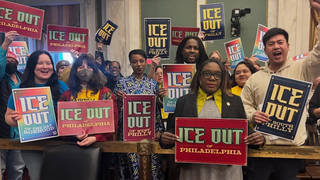
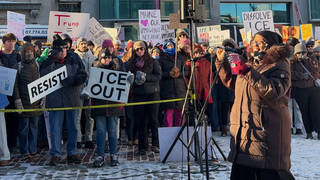
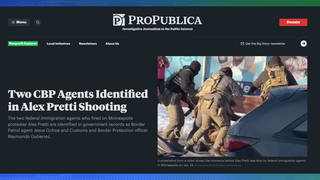





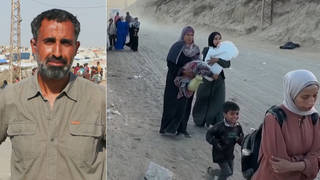

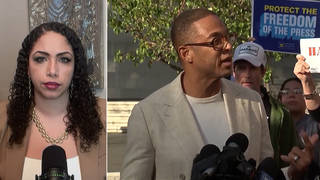
Media Options